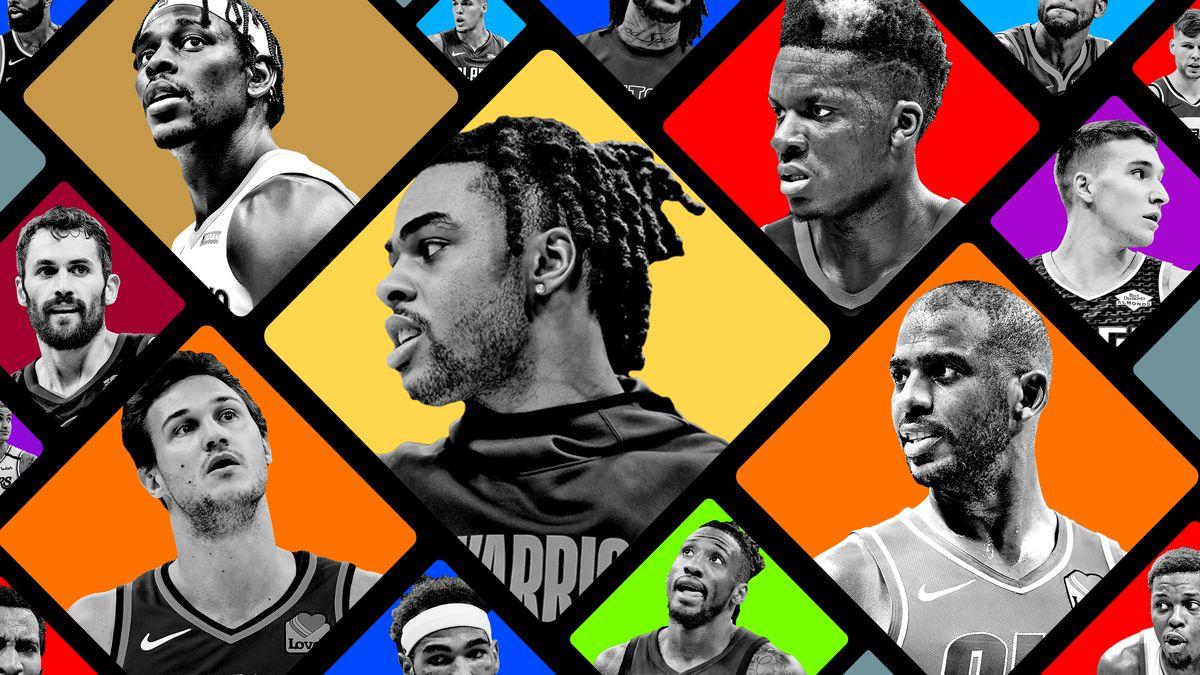On the eve of this NBA season, Sacramento guard Buddy Hield signed a lucrative new contract, extending him for four years at the cost of $86 million (or up to $106 million pending bonuses and incentives). Three months later, Hield lost his starting spot and began coming off the bench.
That drastic swing in fortune parallels the muddled fall of Hield’s team. The Kings finished ninth in the West last season with 39 wins, the franchise’s best performance since 2005-06. Now, they’re in 13th place in the West, on pace for just 30 wins and another spring spent watching other teams compete for a championship. They’re facing thorny questions about the future of the young core that so delighted fans last season, and that means they’re the team to watch before Thursday’s trade deadline—a club that could swing the title race if it decides to sell.
The man who replaced Hield in the Kings’ starting lineup, following a six-game losing streak, is Bogdan Bogdanovic. The third-year sharpshooter and restricted free agent this summer might be the player who can make the most impact if he’s dealt to a contender. But why is Sacramento in the predicament of potentially trading a player of that caliber? To answer that question, we have to rewind.
The Kings are suffering from two key recent decisions. (Well, the franchise has suffered from more than a decade’s worth of poor decisions, but this is a blog post, not a treatise.) The first mistake came in the 2018 draft, when, blessed with their highest pick in the lottery era, the Kings passed on Luka Doncic and Jaren Jackson Jr. to select Duke freshman Marvin Bagley III second overall.
Thus far, Bagley hasn’t cowed any critics or escaped the tweener label. He’s not a 5 capable of anchoring a defense by himself, nor is he a 4 capable of stretching the floor on offense, with a career 28.8 percent 3-point stroke on 1.6 attempts per game. He also hasn’t had much opportunity to prove himself at the NBA level: He’s missed 43 percent of Sacramento’s games in his short career, and is out at least three more weeks now with a lingering foot injury.
Since drafting DeMarcus Cousins in 2010, the Kings’ first-round picks (or the first-round players they acquired in a trade on draft night) have been, in order: Jimmer Fredette, Thomas Robinson, Ben McLemore, Nik Stauskas, Willie Cauley-Stein, Georgios Papagiannis, Skal Labissière, De’Aaron Fox, Justin Jackson, Harry Giles, and Bagley. That’s an almost unfathomable amount of wasted opportunity; nearly every one was picked in the lottery, but only three players remain. Of that trio, Giles will be gone after this season, as the Kings declined his option; Fox is a sure long-term contributor; and Bagley’s fate is still undetermined. It almost goes without saying, though, that Doncic would have been a better choice at no. 2, while Jackson is already establishing himself as a cornerstone in Memphis—able, unlike Bagley, to both defend the interior and shoot 3s (40.5 percent this season on 6.5 attempts per game).
The second mistake was a missed financial opportunity, which complicates talent retention. In July, the Kings re-signed Harrison Barnes—whom they had acquired in a February 2019 trade, before he declined a player option for this season—to a four-year, $85 million contract. This error was apparent right away: By October, before Barnes had played a single game on that new deal, The Athletic’s Shams Charania reported that people around the league felt that the team had “already expressed some remorse over [Barnes’s contract] due to its impact on contracts to come.”
Barnes is a peripheral player for Sacramento, with one of the team’s lowest usage rates (17.7 percent) and little creative potential: He’s averaging a career high in assists this season—at only 2.0 per game. Defenses don’t seem overly concerned with Barnes as an offensive threat; in recent games, they’ve shuffled the likes of Coby White and Chris Paul onto the Sacramento wing without fear of being burned by the size disadvantage. Across the board, advanced metrics from Basketball-Reference, ESPN, and FiveThirtyEight rate Barnes as a below-average player.
Relative to other players in his pay grade, Barnes appears even more impotent. Of the 58 players on contracts that average $20 million per year, according to Spotrac, Barnes ranks 51st in usage rate. (This count doesn’t include John Wall, Kevin Durant, or Klay Thompson, who haven’t played this season.) Most of the players below him are big men who naturally touch the ball less, and make their money primarily by playing defense and setting screens. Barnes fares even worse against his high-money peers by production, ranking 55th out of 58 in box plus-minus. Only three players, who have spent most of the season hurt, (Blake Griffin, Chandler Parsons, and Victor Oladipo) rate worse.
This analysis is not meant to single out Barnes for criticism. But in a sport with a salary cap, devoting all that cap space to a role player incurs tremendous opportunity cost. Picking in the lottery year after year (or trading for youngsters picked there, like Hield) means extensions stack up down the line. Sacramento had to extend Hield; next up is Bogdanovic; after that is Fox, who’s up for an extension this summer; and after that is Bagley, who hasn’t even played a full season of NBA games yet but needs to begin figuring into Sacramento’s long-term cap balance.
Injuries haven’t helped, with both Fox and Bagley missing time. Fox, Hield, and Bagley—ideally the three cornerstones of the next great Kings team—have played just 137 minutes together this season. (In those minutes, for whatever it’s worth, Sacramento had a net rating of negative-14.6; the trio also posted a negative net rating last season.)
“We don’t have the sample size we would like,” first-year coach Luke Walton said before a recent game in Chicago. Practices and drills can help somewhat, he added—but they’re no substitute for games when figuring out which rotations work well, and which players mesh.
For the moment, then, Sacramento essentially must plan for an eventual Bagley extension, and a large Fox offer is guaranteed. Another upcoming pick high in the draft means more money devoted to next year’s top rookie, too. The question then becomes: Can they afford Bogdanovic, too? The Barnes and Hield extensions were front-loaded, meaning they’ll decrease a bit over time, but it’s still difficult to imagine committing something like $75 million annually to three players (Barnes, Hield, and Bogdanovic) at overlapping positions when two more important young players (Fox and Bagley) need paying.
And Bogdanovic, despite his less illustrious pedigree, has proved himself well worth a sizable contract. The Serbian wing came to the Kings almost as an afterthought in a 2016 draft-night trade. Originally picked in 2014, Bogdanovic was still playing in Europe when the Suns sent his rights to Sacramento. But while every other player in that ill-fated trade—Marquese Chriss for the Suns, Papagiannis and Labissière for the Kings—cratered, Bogdanovic found a suitable role in the modern NBA.
The first stat that jumps off Bogdanovic’s page is his shooting—a career 37.5 percent 3-point mark on more than five attempts per game. Bogdanovic has a quick, accurate shot and considerable range, and he’s not a zero off the bounce either, with an average handle in the pick-and-roll and a deceptively successful isolation game. He even registers around average or better as a defender, according to various advanced stats.
So any team that needs extra shooting and secondary playmaking for the spring—hint: that’s every wannabe championship contender—could use Bogdanovic’s services. The Lakers and 76ers in particular have been connected to him, and it’s easy to envision Bogdanovic transforming those offenses, which can sometimes grow cramped inside the arc.
The Kings have been reluctant to move Bogdanovic. The Athletic’s Jason Jones reported last month that it would take a “crazy offer” to convince the Kings to make a deal, while NBC’s James Ham noted that they want to keep Bogdanovic through the summer and extend him.
But Bogdanovic didn’t accept an extension worth $51.4 million over four years, the max Sacramento was allowed to offer him in-season, meaning the Kings would potentially need to match any he receives in restricted free agency. And given the dearth of impact free agents this summer, Bogdanovic may receive a far more lucrative offer. It takes only one interested team to force the Kings’ hand, and Bogdanovic’s skill set is mighty valuable. Is Sacramento willing to take that risk? The answer may swing the title race.
Beyond future financial challenges, the Kings are navigating the dual difficulties of losing lots of games—while trying to incorporate Walton’s slower-paced offensive system—and benching their soon-to-be highest-paid player. In Chicago, before the first game with the new order, Walton emphasized that the swap of Bogdanovic to the starting lineup and Hield to the sixth man spot was “not a punishment to Buddy at all.”
Instead, he wanted to shake up the rotation to stem the slump, while also trying to increase the shared court time for Bogdanovic and fellow Serbian Nemanja Bjelica. Walton said that because of all the injuries, it had been somewhat difficult to forge chemistry between newish teammates—and at least Bogdanovic and Bjelica know each other’s tendencies from international tournaments.
Hield has played well since moving to the bench, averaging 23.4 points per game while making 49 percent of his 3s, as the Kings have won three of five games (including a miraculous comeback against the Timberwolves). But for as professionally as he has taken the demotion, frustration has appeared to simmer under the surface. “You want to figure out the reason for that,” Hield said in Chicago. “You never get a straight-cut, clear answer, but as a player, as a professional, you go out there and lock in and whatever the coach wants you to do, you do. Regardless if you like it or not, you’ve still got to be locked in and you’ve still got to be ready to play and when he calls your number, just produce.”
Hield is a 20-points-per-game scorer and a $20 million-per-year player. He probably feels like he’s earned a starting spot. But his move to the bench only underscores all of Sacramento’s logistical difficulties, both now and in the future: It’s unclear whether the team’s best players can play together at the same time, or even be paid on the same solvent cap sheet.
The Kings ranked among the most exciting teams last season, finally taking bounds forward after years running in place. Now they’ve been demoted—to the bench, to the bottom of the Western standings, to another difficult contemplation of a roster that might not be viable, or good enough to succeed. All the Kings wanted was a playoff chase this season. Instead, they’re facing another crisis—and actual contenders might be able to pounce.

